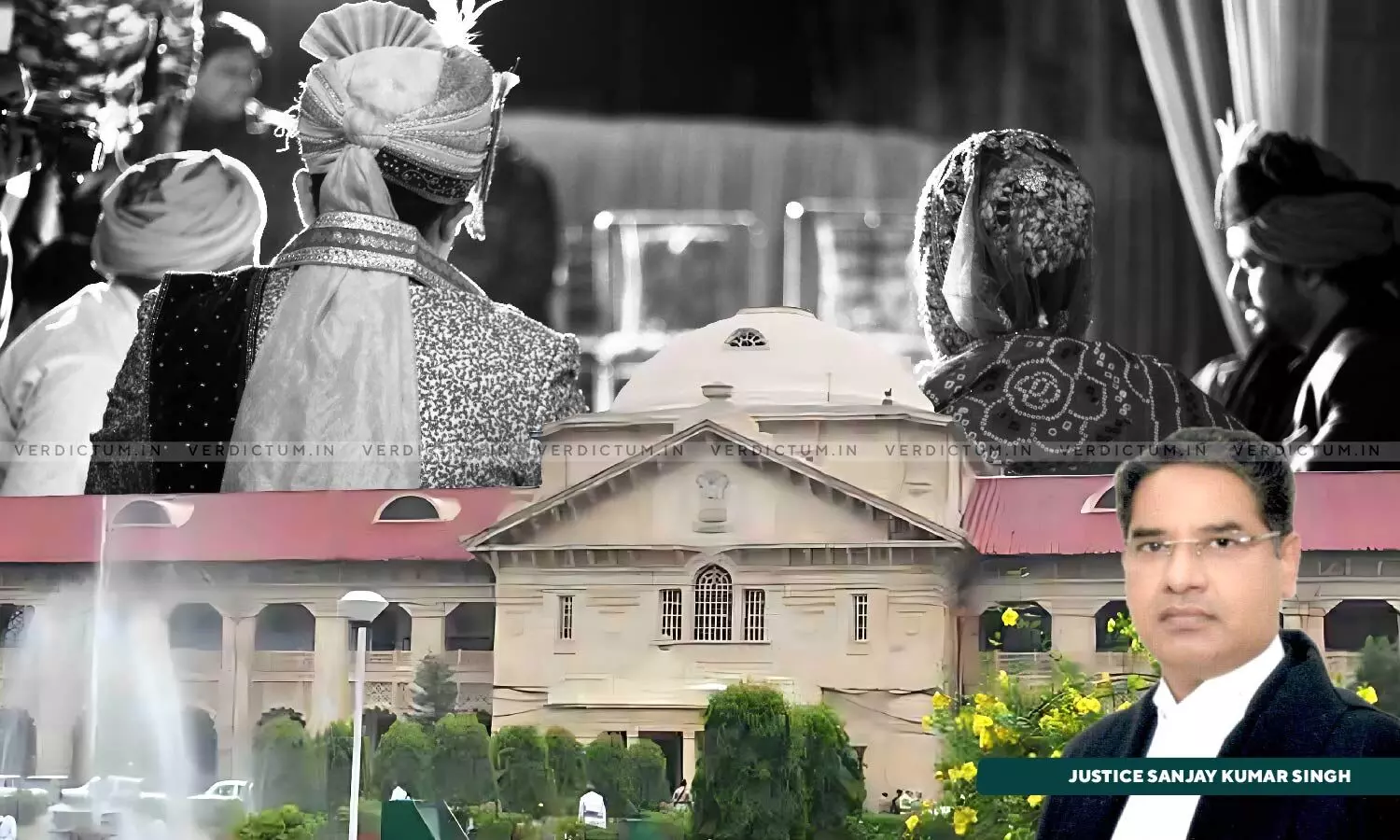
A Hindu Marriage Without ‘Saptapadi’ (Saat Phere) Ceremony Between Parties Is Not Valid As Per Law: Allahabad High Court
 |
|The Allahabad High Court has held that a Hindu Marriage without ‘Saptapadi’ ceremony i.e., ‘Saat Phere’ between parties is not valid under the Hindu Marriage Act, 1955 (HMA).
The Court was dealing with an application under Section 482 CrPC with a prayer to quash the summoning order and proceedings of the case under Sections 494 and 109 IPC pending before the Civil Judge (J.D.) F.T.C. 1st, Varanasi.
A Single Bench of Justice Sanjay Kumar Singh observed, “The 'Saptapadi' ceremony under the Hindu Law is one of the essential ingredients to constitute a valid marriage but the said evidence is lacking in the present case. Even there is no averment with regard to 'Saptapadi' in the complaint as well as in the statements under Section 200 and 202 Cr.P.C., hence, this Court is of the view that no prima-facie offence is made out against the applicants as the allegation of second marriage is a bald allegation without corroborative materials.”
The Bench took note of the fact that the word 'solemnize' means, in connection with a marriage, 'to celebrate the marriage with proper ceremonies and in due form' and unless the marriage is celebrated or performed with proper ceremonies and due form, it cannot be said to be 'solemnized'.
Advocate Saurabh Sachan appeared for the applicants while Additional Government Advocate Rabindra Kumar Singh appeared for the opposite parties.
Brief Facts -
In 2017, the marriage of the complainant/opposite party was solemnized with the applicant as per Hindu Rites and Rituals but their marriage was not successful and on account of acrimonious relation and matrimonial dispute, applicant lodged an FIR. A case was registered for the offence under Sections 498-A, 323, 504, 506, and 354 of IPC and Sections 3/4 of Dowry Prohibition Act against the opposite party and his other family members. The charge-sheet was challenged by the accused persons including the opposite party by filing an application under Section 482 CrPC, in which the matter was referred to mediation and conciliation centre vide order but the mediation between the parties failed.
The applicant also filed a criminal misc. case under Section 125 of Cr.P.C. before the Principal Judge, Family Court, Mirzapur which was decided ex-parte and the opposite party was directed to pay a sum of Rs. 4,000/- per month to his wife (applicant) until she gets remarried. Thereafter, opposite party gave an application before the Higher Police Officials making allegation of bigamy against his wife but the same was found false. The Magistrate, after recording the statement of the complainant under Section 200 CrPC and his witnesses, summoned the applicants as well as other co-accused persons under Sections 494/109 IPC which was the subject matter of challenge in the application.
The High Court in view of the facts and circumstances of the case noted, “If the marriage is not a valid marriage, according to the law applicable to the parties, it is not a marriage in the eyes of law. It is also well settled that to constitute an offence under Section 494 I.P.C., it is necessary that the second marriage should have been celebrated with proper ceremonies and in due form.”
The Court said that in absence of cogent evidence, it is difficult to hold that the 'Saptapadi ceremony' of the marriage as contended by the complainant was performed so as to constitute a valid marriage between the parties concerned.
“As such on taking into consideration the contents of the complaint on it's face value, the basic ingredients to constitute an offence under Section 494 read with section 109 of I.P.C. are lacking, hence, no offence is made out against the applicants. … this Court is of the view that the criminal proceedings against the applicants initiated by opposite party No. 2 is nothing but a malicious prosecution with an ulterior motive, which is clear abuse of process of the Court. Impugned summoning order dated 21.04.2022 of this case is not sustainable”, held the Court.
The Court concluded that it is the solemn duty of the court to protect apparently an innocent person, not to be subjected to such frivolous prosecution based on wholly untenable allegations and complaint and that if criminal proceeding is allowed to go on, the same will tantamount to causing grave miscarriage of justice.
Accordingly, the High Court allowed the application and quashed the case against the applicants.
Cause Title- Smriti Singh Alias Mausami Singh and 3 Others v. State of U.P. and Another (Neutral Citation: 2023:AHC:181300)